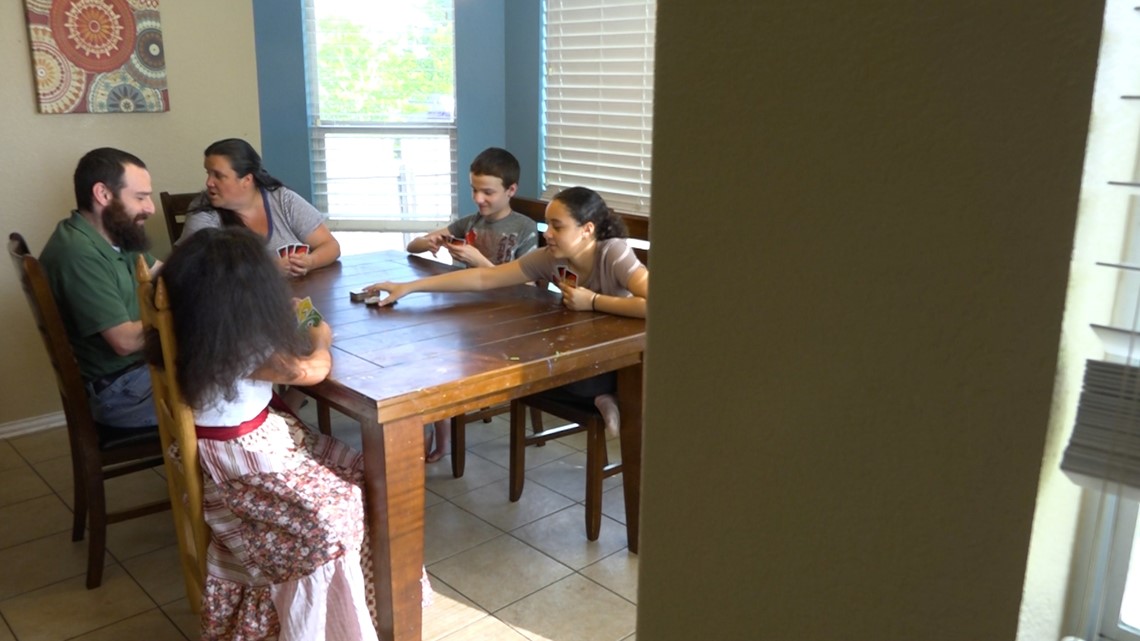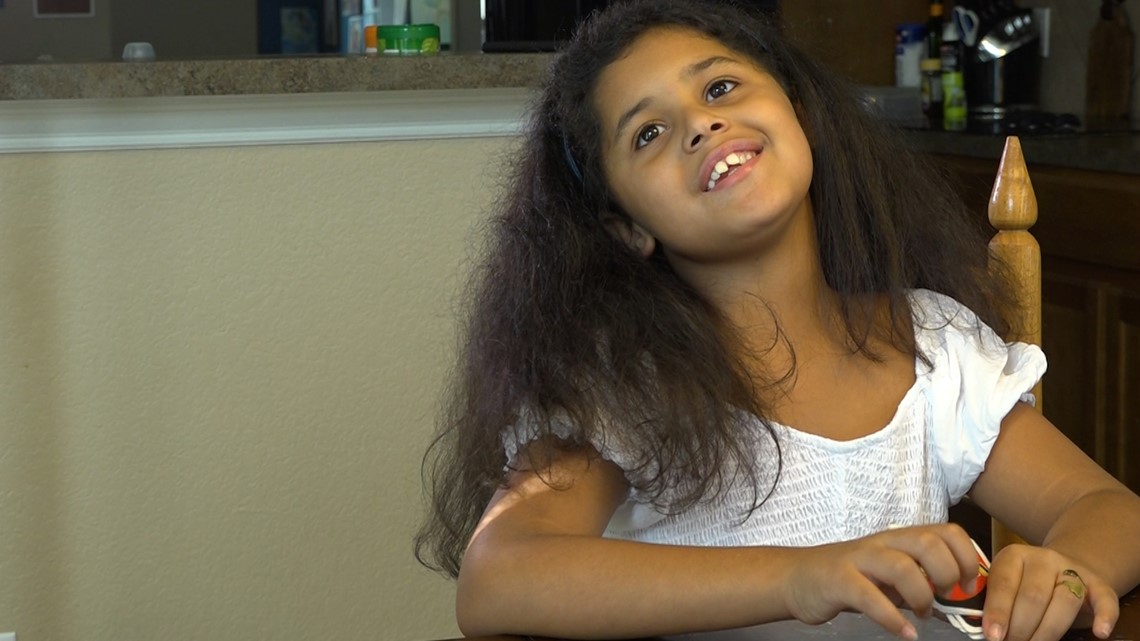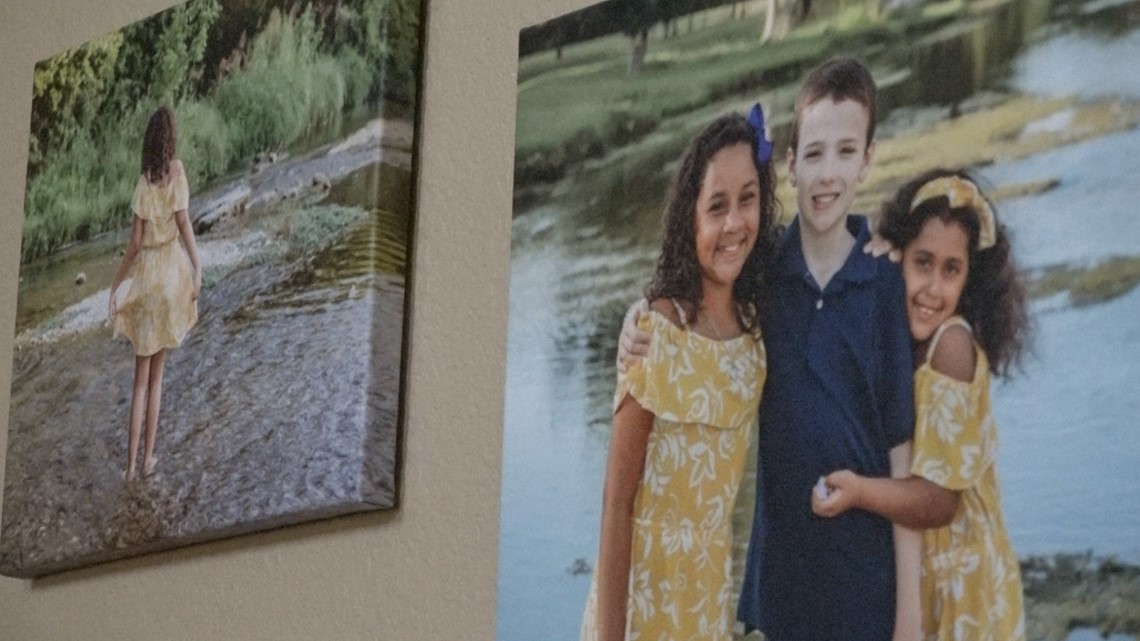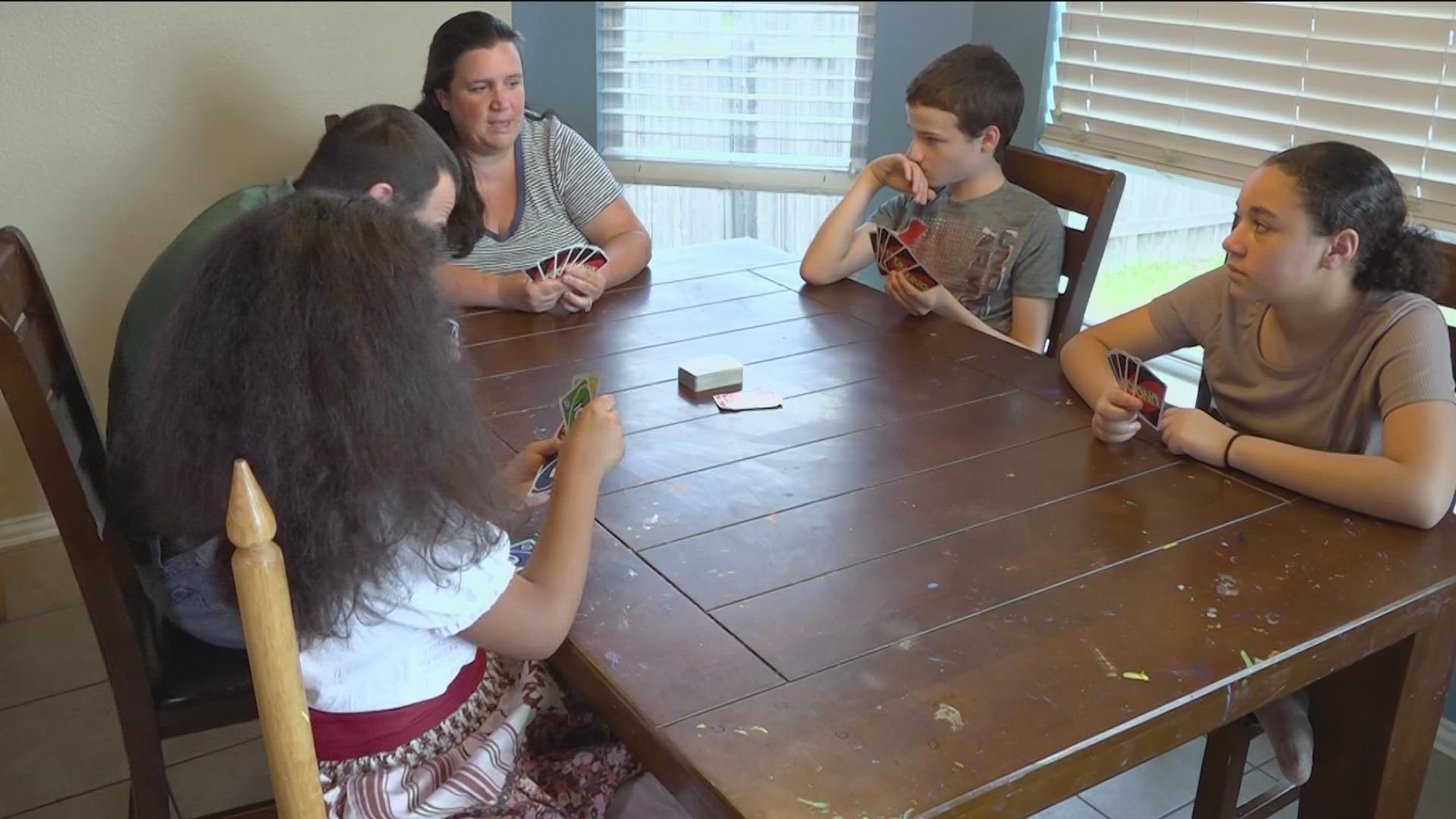TEXAS, USA — There are nearly 13,000 kids in foster care in Texas and, right now, there are not enough foster homes to house all of them.
The Feldman family in Hutto is one of the foster families who takes in kids needing a place to stay.
“They didn't ask to be in the situation, you know?” said Alicia Feldman, a foster parent. “And that's my biggest thing. I always feel like, these kids did not ask for this.”
That’s why, right now, this family of five is actually a family of six.
“We've had him for five months, and he might just be the happiest little baby I've ever met,” said Dan Feldman of the baby boy he and his wife, Alicia, are fostering.
Dan and Alicia Feldman have been fostering children for the past 10 years. Right now, they’re fostering an 8-month-old baby boy who is growing stronger after coming to them straight from the NICU.
“He can’t crawl on his hands and knees yet, so he just kind of does this little army crawl. So, it's really cute. He's almost like an inchworm,” laughed Alicia.
For the Feldman kids – Joshua, Ariana and Layla – fostering is a family affair.
“Every morning I ask him, ‘Why are you so cute?’ but he doesn’t give me a response,” laughed Joshua Feldman, speaking of the baby his family is fostering.
Joshua is the oldest child in the Feldman family and was born to his parents, Alicia and Dan.


“We get to help out with them and then I get to play with them a lot,” said Layla, the middle child.
“I love to feed them and I just want to adopt all of them,” said Ariana, who is the youngest in the house, aside from the baby they are fostering.
Caring for those in need
The Feldmans have fostered seven different children, with stays ranging from two weeks to 18 months. But they kept their first two foster children just a little bit longer.
“We did get to adopt our first two placements. Both of our daughters, they're sisters,” smiled Dan.
Dan and Alicia choose to foster kids between the ages of 0 and 2, as they feel that is where they are best equipped.
Some of the kids they have cared for have experienced neglect, others were impacted by drugs in the womb.
“Some of our babies that have come to us specifically, they are still going through withdrawals,” explained Alicia. “It's a whole different ballgame. They're screaming, they're rigid, they’re shaking.”
This is just one example of why these babies need extra love and care, because even at that age, their minds are processing trauma.
“Every time you hold a baby, inside their little brain it’s like, ‘Yes, yes, yes, this is what I'm supposed to do. This is what's supposed to be given to me,’” said Alicia. “So, we hold all the babies all the time.”
Dan and Alicia say the goal is to keep the babies safe, until they can hopefully reunite with their biological families.
“You cannot put yourself in these bio-parents shoes,” said Alicia. “You don't know what they have been through. You don't know what kind of trauma they've experienced.”


Texas needs more foster families
Workers with the Department of Family and Protective Services (DFPS) said showing care for both the kids and biological parents is an important part of the system.
“Foster parents play a critical role in breaking the generational cycle just by being safe, stable, loving people,” said Amy Smith, a foster and adoptive home development specialist with DFPS. “They role model to the children and the biological families what safe behaviors are and what healthy relationships are.”
Smith said, right now, the need for more foster families is a big one.
According to DFPS, as of the end of March, there were nearly 13,000 kids in foster care in Texas, with more than 1,700 from right here in Central Texas – and 952 were over the age of 10.
From Jan. 1, 2022, to the end of March 2022, judges had ordered 2,422 children be removed from their homes as a result of abuse or neglect.
Each night, statewide, there are about 70 to 80 kids without a placement. DFPS said it works with partner organizations to find them places to stay.
At one point last summer, the system reached about 400 kids without placement.
“You know, all of these kids need placements, whether it's emergency foster homes, whether it's longer-term foster homes, whether it's an adopt-only home. So, I mean, people just need homes,” said Smith.
Taking in emergency placements
The Feldmans are one of the families who take in emergency placements.
“Usually within a couple of hours we'll get a phone call, and then a few hours later, there's a kid showing up at the door,” said Dan.
Smith said families that can take emergency placements and families that can take in sibling groups are needed right now in Texas, as they want to try to keep siblings together.
They say having more foster families here in Central Texas is necessary, so kids can stay closer to their biological parents and what they are familiar with, which has not always been able to happen in the past.
“Babies and younger ones were being separated as far as two and three hours from their biological parents,” shared Alicia. “So, there wasn't any way to do visits or anything like that because they didn't have enough foster families.”


The Feldmans said with the right support, like from their agency, Depelchin Children’s Center, you can do it.
“We really work with you to figure out, you know, what age of child you're going to be most compatible with, what level of need you feel comfortable taking on,” shared Jesse Booher, the chief operations officer at Depelchin Children’s Center.
Booher said these kids cannot heal until they find some sort of stability, especially the older children.
“You know, the behaviors that we see are manifestations of that trauma, and that's not a bad thing,” said Booher. “We want to know what the trauma is; we want to know how it's manifesting, so we can help heal it.”
'They're part of our family'
Being a foster parent is a role that is challenging, but far more than that, it is rewarding.
“They’re our child while they're here, if they're here for two weeks or if they're here for 18 months or forever,” said Alicia. “They're our family, they’re part of our family.”
The Feldmans say the hardest part is when the babies have to leave, but they say you need to love them with everything you have, even if it hurts more when it is time for them to go.
“Go all in. You're going to have to have your heart broken in order to love these kids, to help these kids,” said Alicia. “So just be prepared to have the valleys, with the mountains, with the trials, but it’s blessings at the same time.”
The Feldmans say as long as they and their children all want to keep fostering, they will do so as long as they can keep making an impact.
“No child has ever asked to be born into anything, like any trauma or anything like that,” said Alicia. “So, if we can do our little part, then we're here to help.”
The Feldmans say that one misconception is that people foster children to get money from the State. The Feldmans say they do not know any families that do it for that reason, and that the money they get doesn’t even cover it. Smith, with DFPS, told us on average a family gets $27 per day for each child. If a child has more needs, it can be higher.
How to help
Some of the basic requirements for being a foster parent in Texas are:
- Can be single or married
- Be at least 21 years of age, financially stable and responsible, mature adults
- Share information regarding their background and lifestyle
- Provide relative and non-relative references
- Agree to a home study, which includes visits with all household members
- Allow staff to complete a criminal history background check and an abuse/neglect check on all adults in the household
- Attend free training to learn about issues of abused and neglected children.
If you are not able to foster, but want to help, you can become a respite or certified babysitter. Foster families cannot use any babysitter they want, so having more certified babysitters allows the parents to have some time to themselves.
There is also a need for mentors and donations. Many different agencies and nonprofits will take donations, including the DFPS Rainbow Rooms.
The Feldmans say some good items to donate to foster families and foster kids are sleeping bags, backpacks, clothing and H-E-B gift cards.
Editor's note: KVUE is not showing the Feldmans' baby's face since he is currently in foster care.
PEOPLE ARE ALSO READING:

